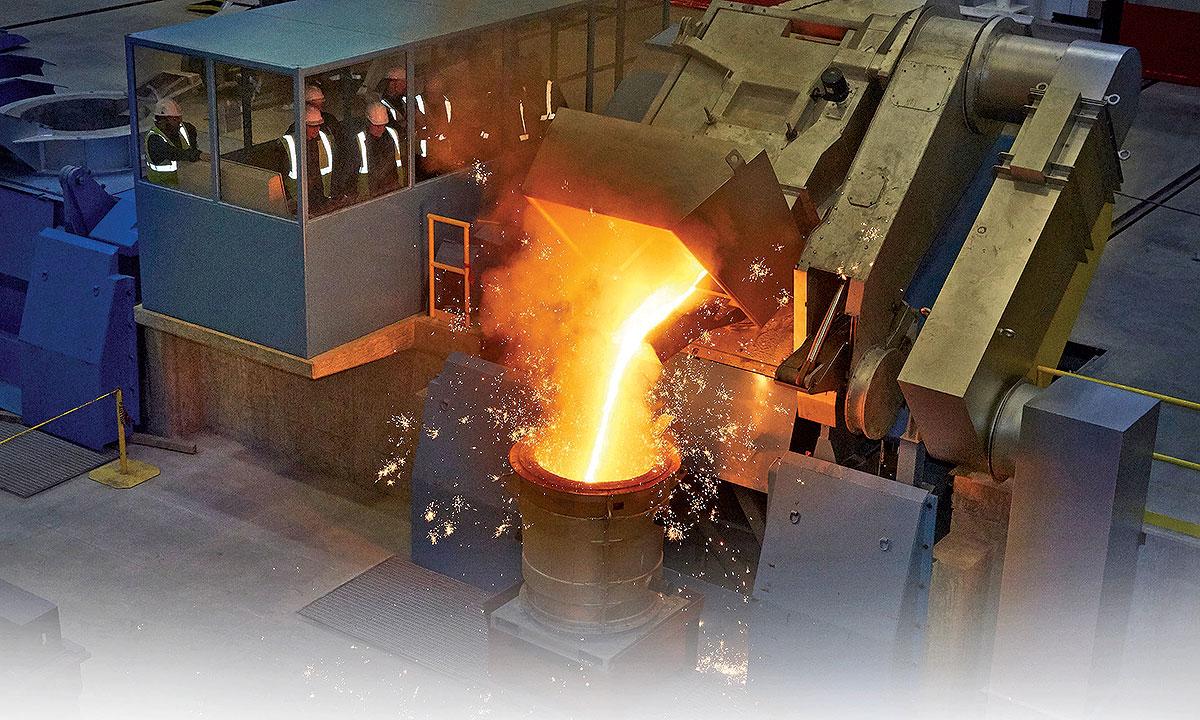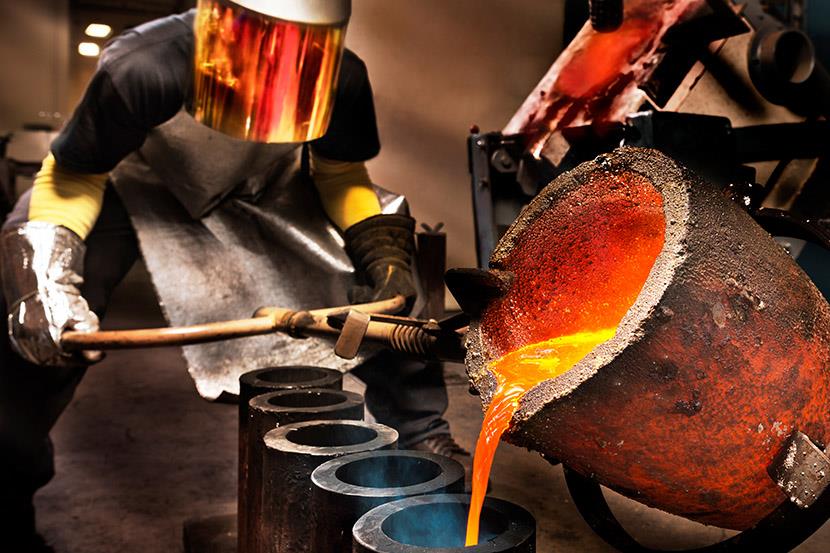Essential resource to finding the right Aluminum Foundry for your production needs
Just How a Metal Foundry Adds to Lasting Metal Production Practices
Metal foundries play an important duty in advertising sustainability within the metal manufacturing market. By integrating recycled products, they reduce dependence on virgin sources and minimize environmental impacts. Energy-efficient melting processes additionally decrease power consumption and exhausts. The journey toward sustainable practices involves even more than simply reusing and power management. It encompasses a broader commitment to moral sourcing and innovative technologies. The effects of these techniques are considerable and warrant better assessment.
The Role of Recycling in Metal Foundries
While metal production has commonly relied on virgin products, the increasing focus on sustainability has actually led to a significant change in methods, especially in metal foundries. Recycling has actually become a vital element of this change, allowing foundries to repurpose scrap metal and decrease dependence on extracted resources. By incorporating recycled materials right into their processes, foundries not only decrease ecological effect however additionally lower manufacturing prices.
The usage of recycled steels, such as steel, copper, and aluminum, reduces energy consumption and reduces greenhouse gas emissions connected with standard mining and refining techniques. In addition, foundries can accomplish top notch outputs by using sophisticated sorting and processing modern technologies to guarantee the pureness of recycled products. This emphasis on reusing fosters a circular economic situation, where waste is lessened, and resources are made use of effectively. As a result, metal foundries play a pivotal duty in advertising lasting methods within the metal manufacturing market.
Energy-Efficient Melting Methods
Energy-efficient melting techniques are crucial for boosting sustainability in metal production. These methods substantially minimize power consumption throughout the melting procedure, which is one of the most energy-intensive stages in metal manufacturing. Technologies such as induction melting, resistance heating, and microwave melting deal enhanced performance contrasted to traditional techniques. Induction melting, for example, makes use of electro-magnetic fields to generate warm straight within the metal, decreasing energy loss and offering exact temperature control.
In addition, implementing warmth healing systems can further enhance effectiveness by capturing and recycling waste warm generated throughout melting. Utilizing sophisticated insulation products and maximizing furnace styles additionally add to energy savings. By taking on these innovative melting techniques, metal foundries can decrease their carbon footprint, reduce functional expenses, and add to a much more sustainable production landscape. The combination of energy-efficient techniques not just aligns with environmental objectives yet also meets the growing demand for responsible manufacturing approaches in the metal sector.
Lasting Sourcing of Raw Materials
Lasting sourcing of raw products is essential for lessening the environmental impact of metal production. This entails the increased utilization of recycled metals, the fostering of moral mining practices, and initiatives targeted at local sourcing. By focusing on these approaches, the industry can promote liable source monitoring and assistance neighborhood economic situations.

Recycled Metal Usage
How can industries efficiently lower their environmental impact while fulfilling the expanding need for metal? One substantial technique is the use of recycled metal. By including scrap metal right into their manufacturing procedures, foundries can decrease the removal of virgin products, thus lowering and preserving all-natural resources power consumption. Recycled metals call for less energy to process contrasted to their raw equivalents, leading to reduced greenhouse gas exhausts. Additionally, making use of recycled metal helps divert waste from garbage dumps, advertising a circular economic climate. Industries that prioritize recycled metal not just add to sustainability yet also benefit from expense financial savings connected with decreased product purchase. Recycled metal usage stands as a vital technique for ecologically liable metal production.
Moral Mining Practices
While the demand for metals remains to increase, industries are progressively recognizing the value of honest mining practices in making sure accountable sourcing of resources. Ethical mining incorporates a commitment to ecological stewardship, social responsibility, and adherence to reasonable labor techniques. Firms are currently prioritizing collaborations with mines that show transparency in their procedures, decreasing ecological impact and respecting local neighborhoods. This technique not just promotes a sustainable supply chain however likewise enhances the online reputation of services entailed. By carrying out rigorous criteria and accreditations, markets can battle illegal mining tasks and promote the welfare of employees. Ultimately, honest mining practices contribute substantially to an extra sustainable metal manufacturing environment, aligning financial development with environmental and social integrity.
Local Sourcing Campaigns

Advancements in Metal Casting Processes
Technologies in metal casting processes are changing the sector by incorporating advanced recycling techniques that reduce waste. Energy-efficient melting techniques are also being developed to decrease energy usage during production. Additionally, making use of cutting-edge mold materials adds to boosted performance and sustainability in casting procedures.
Advanced Recycling Techniques
Advanced recycling strategies are changing metal casting procedures, considerably improving sustainability in the industry. These technologies concentrate on recovering and recycling scrap metal, significantly lowering waste and the demand for virgin products. Strategies such as hydrometallurgy and pyrometallurgy make it possible for foundries to extract important metals from utilized components, making certain efficient source use. Furthermore, advanced sorting and filtration innovations improve the top quality of recycled steels, making them suitable for high-performance applications. This not just minimizes the environmental footprint of metal production however additionally fosters a round economy by promoting the reuse of materials. As these recycling approaches remain to advance, they assure to additionally streamline procedures within foundries and add to a more lasting metal production landscape.
Energy-Efficient Melting Techniques
While traditional melting approaches have actually long been the backbone of metal casting, recent improvements have introduced energy-efficient techniques that markedly decrease energy consumption and emissions. Technologies such as induction melting and electrical arc heaters have actually acquired prominence, enabling precise control over temperature level you can try these out and lowering the demand for fossil fuels. These approaches not just improve energy efficiency yet additionally promote much faster melting times, which equates to reduce operational prices. In addition, technologies in warm recovery systems allow foundries to record and recycle excess warm generated throughout the melting process. This holistic approach to energy administration not just supports sustainable practices but additionally placements metal foundries as leaders in the change in the direction of greener manufacturing processes, better straightening with global sustainability objectives.
Innovative Mold Materials
As the demand for even more efficient and lasting metal casting processes grows, the expedition of innovative mold products has actually ended up being a centerpiece in the market. Conventional mold materials frequently contribute to ecological obstacles, prompting the search for alternatives that lower waste and power usage. Recent advancements consist of the growth of recyclable compounds and naturally degradable binders, which not just boost mold efficiency yet likewise minimize ecological impact. In addition, using 3D printing technology in mold and mildew production enables for elaborate layouts that minimize material use and enable quick prototyping. These ingenious products not only boost casting accuracy yet likewise align with sustainability objectives, showcasing the market's dedication to reducing its carbon footprint while maintaining high-quality manufacturing standards.
Minimizing Waste With Advanced Modern Technology
Ingenious innovations are changing the metal manufacturing industry by significantly lowering waste and enhancing efficiency. Advanced data analytics and artificial intelligence formulas allow foundries to optimize production processes, determining inadequacies and minimizing scrap material. Smart sensors keep track of equipment performance in real-time, allowing for anticipating upkeep that minimizes downtime and waste generation. In addition, additive production strategies, such as 3D printing, enable the creation of complex components with very little product use, significantly reducing waste compared to traditional approaches.
Closed-loop systems are coming to be much more prevalent, in which scrap metal and by-products are recycled back right into the manufacturing cycle, guaranteeing that materials are utilized to their greatest possibility. This combination of modern technology not only advertises source conservation yet additionally enhances the total sustainability of metal manufacturing methods. By embracing these advancements, foundries can add to an extra lasting future while preserving competition in the market
The Influence of Foundries on Carbon Footprint Decrease
Foundries play an essential function in decreasing the carbon impact of the metal production sector by carrying out numerous sustainable methods. By making use of energy-efficient innovations, such as electric arc heaters, these facilities substantially lower greenhouse gas exhausts compared to standard methods. Furthermore, foundries increasingly adopt renewable resource resources, which likewise decreases their dependence on fossil fuels.
Reusing scrap metal is an additional vital technique that foundries employ, saving sources and reducing the requirement for virgin products. This not only reduces waste however also minimizes the energy-intensive removal processes associated with mining. The adoption of closed-loop water systems helps to reduce water usage and minimize wastewater discharge, adding to an extra lasting procedure.
Through these initiatives, foundries demonstrate their commitment to environmental stewardship, resulting in a marked reduction in the general carbon impact of the metal manufacturing market. Their continuous initiatives are critical in the shift toward an extra lasting industrial landscape.
Frequently Asked Questions
What Types of Metals Are A Lot Of Frequently Recycled in Foundries?
Light weight aluminum, this content steel, copper, and brass are among one of the most generally recycled steels in foundries. These steels are favored because of their high recycling rates, economic value, and prevalent schedule, adding substantially to commercial sustainability initiatives.
Exactly How Do Foundries Guarantee the High Quality of Recycled Products?
Foundries ascertain the quality of recycled materials through rigorous screening, sorting, and filtration procedures. They carry out advanced technologies to assess structure and remove contaminations, assuring that the recycled metals meet sector standards for efficiency and safety and security.
What Accreditations Exist for Lasting Foundry Practices?
Numerous qualifications exist for sustainable foundry techniques, including ISO 14001 for environmental administration, ISO 50001 for power administration, and LEED certification for lasting building techniques (Metal Foundry). These accreditations help assure adherence to ecological and sustainability standards in procedures
How Do Foundries Measure Their Carbon Impact Reduction?
Foundries gauge carbon footprint decrease through tools like lifecycle assessments, power audits, and emissions tracking systems. They contrast standard emissions to present outputs, reviewing enhancements in power efficiency, product use, and renewable resource adoption gradually.
What Are the Economic Advantages of Lasting Metal Production?
Lasting metal manufacturing supplies financial benefits such as minimized functional costs, raised efficiency, improved market competition, and possible government incentives. In addition, it fosters advancement and brings in eco conscious consumers, inevitably driving long-term success for services.
Metal foundries play a vital function in advertising sustainability within the metal manufacturing industry. While metal production has traditionally relied on virgin materials, the enhancing emphasis on sustainability has led to check these guys out a significant shift in methods, especially in metal foundries. By integrating scrap metal right into their manufacturing processes, foundries can decrease the removal of virgin products, therefore conserving all-natural resources and lowering energy consumption. Foundries play a necessary function in minimizing the carbon footprint of the metal production industry by carrying out numerous sustainable techniques. Reusing scrap metal is an additional essential technique that foundries employ, preserving sources and reducing the requirement for virgin products.